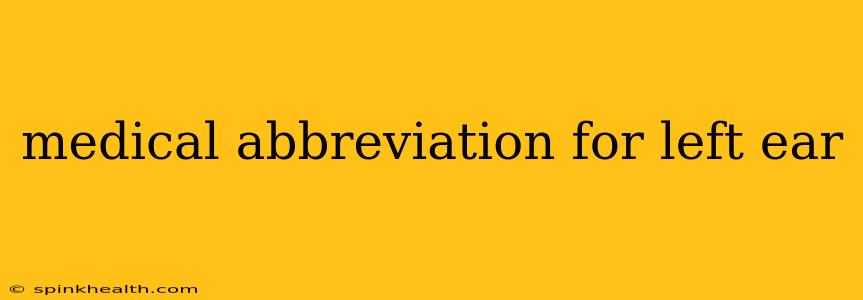Decoding the Doctor's Notes: Understanding the Medical Abbreviation for Left Ear
Have you ever stared at a medical chart, puzzled by a string of letters and numbers? The world of medical abbreviations can seem like a secret code, but understanding them is crucial, especially when it comes to your health. Today, we'll unravel one common abbreviation: the medical shorthand for "left ear."
The mystery is quickly solved. The medical abbreviation for left ear is simply AS, derived from the Latin word auris sinistra.
This seemingly simple abbreviation can be incredibly important. Imagine the scenario: you're reviewing your child's medical records, or perhaps discussing a treatment plan with your doctor. Seeing "AS" clearly and quickly indicates the location of a potential issue, ensuring that the correct treatment is applied to the correct ear. Misunderstanding this abbreviation could have serious consequences.
What are other common ear-related abbreviations?
Beyond understanding "AS", it's helpful to familiarize yourself with other common abbreviations related to the ears. These can often appear alongside "AS" or in other contexts in medical documentation. Knowing what they mean can empower you to be a more engaged and informed patient.
AD: This is the abbreviation for the right ear, coming from the Latin auris dextra. You'll often see "AS" and "AD" used together when comparing information from both ears.
AU: This abbreviation stands for both ears, derived from the Latin auris uterque. It's a concise way to indicate that a condition or treatment applies to both the left and right ear.
OU: This abbreviation relates to both eyes. While it doesn't directly relate to the ears, it is important to know the distinction when reading medical documents.
Why are medical abbreviations used?
The use of abbreviations in medicine isn't simply a matter of brevity. It's a system designed for efficiency and clarity within a high-pressure environment. Doctors, nurses, and other medical professionals need to record information quickly and accurately, and abbreviations help streamline this process. While the occasional misunderstanding might occur, the overall benefits of this system significantly outweigh the risks, provided everyone involved is familiar with the common abbreviations.
How can I improve my understanding of medical terminology?
If you're interested in becoming more familiar with medical abbreviations and terminology, there are several resources available. Online medical dictionaries offer detailed explanations and examples. You could also consider taking a basic medical terminology course, either online or in person, to deepen your understanding of these vital communication tools. Becoming better versed in this "language" empowers you to participate more fully in your healthcare journey.
Learning medical abbreviations, even simple ones like "AS," can significantly improve your health literacy. This knowledge empowers you to be a more involved and informed patient, facilitating better communication with your healthcare providers and leading to improved health outcomes. It's a small step toward taking control of your health journey.

